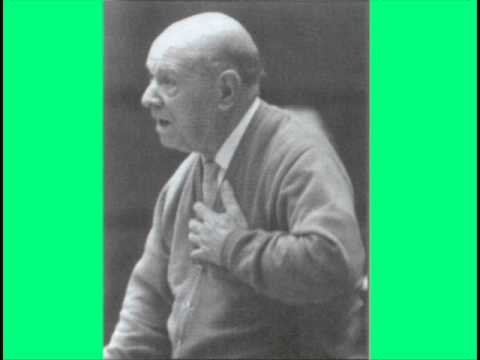The Slipped Disc daily comfort zone (2)
mainI saw him conduct in Jerusalem in 1971.


A social media activist has circulated a video…

A PR informs us this morning that the…

Zachary Woolfe, chief music critic of the New…

The Berlin State Opera communicated tonight that its…

Session expired
Please log in again. The login page will open in a new tab. After logging in you can close it and return to this page.
I was there too!!! with Sasha Schneider and very young Shlomo Minz
Putting aside his unmatchable ‘cello artistry for a moment, Casals was one of the all-time greatest Mozart conductors.
The Marlboro recordings of Casals, as conductor and, of course, as a cellist, are priceless. My ears tell me that his legacy lives on there. Let us hope that by June life will resume in this sacred place.
So presumably this is when PC received the UN Peace Medal ? Is there a recording of him playing at the event rather than the over-voice clips here, which seem to be from his famous recording ?
https://www.youtube.com/watch?v=xOXvZSKFbBA
He looks like Lovro von Matacic in the photo. A fine conductor and composer in his own right, Lovro… also a bit compromised with the Nazi-allied Croatian regime of 1940-45, but hell, who wasn’t?!
With Erich Kleiber, Arturo Toscanini…
With many others there are countless shades of grey.
Casals himself, for instance, wasn’t the least bit compromised. Or Fritz and Adolf Busch. Or Toscanini. Or Lotte Lehmann. And none of them were Jewish or politically active, so they had a choice, just like Matacic, Böhm, Karajan, Schwarzkopf, Mengelberg had a choice.
I don’t want to suggest that we should eternally condemn the people who made the wrong choice. But whenever this topic comes up, we should applaud the brave people who had a strong moral compass when they had to make their choice…
Yes, I agree, we should applaud Erich Kleiber and Toscanini. However, since they already had a reputation, it was easier for them to go abroad than some others who had not really started their careers, like Karajan, for instance.
The Pau Casals Orchestra was a major cultural force in Barcelona during the 1920s an 1930s. They regularly promoted modern music, and had guest conductors like Richard Strauss and Igor Stravinsky. Everything was destroyed by fascism after the Spanish Civil War, of course.
You can hear that orchestra in the famous 1929 recording of the Brahms “Double” Concerto that Casals recorded with Thibaud. Cortot conducts.
Righto, David….
And you can also hear that orchestra on a 2-LP set issued by Odeon/DaCapo (1C 187-03 039/40 M), billed as the “Orquesta Casals de Barcelona”.
Casals conducts it in the Beethoven 1st and 4th Syms and the Ruins of Athens Overture (all 1929). The orchestra is excellent and Casals’ conducting is superb.
Also on this set is my all-time favorite version of the Brahms Haydn Variations – Casals conducting the London Sym. (1928).
I was fortunate to encounter Casals twice. In Central America when he conducted his oratorio “El Pesebre”
and I was participating in the same festival in El Salvador,
accompanying pianist Van Cliburn. Next was in San Juan,
Puerto Rico on Christmas day, at Casals birthday gathering. Both unforgettable experiences.
Thank you Maestro. I am sure you have many more lovely anecdotes to share from your long and distinguished career!
At a master class in UC-Berkeley, a brash young cellist attempted the beginning of Bach’s C-major suite, making many errors but playing on as Casals tried to stop him. When he finally did, Casals leaned in sternly and said, “Always remember what I am about to tell you. In music as in life, when we make a mistake, we must correct it, immediately. Now go.” And he wouldn’t hear another note or word.
In the same class, he told a female student “You play that like you are in a telephone booth.”
Saw him conduct in Israel. In 1973, his last public appearance, with an international youth orchestra : Mozart symphony # 33….unforgettable!
There must be quite a few who still remember Casals conducting his oratorio ‘El Pessebre’ at the RFH, London on September 29th, 1963. He came on like death warmed up barely making it to the podium or so it seemed. However, as soon as he began to coduct he sprang to life and threw himself about like a young boy. At the end, he made his exit if anything more laboriously than his entrance. A group of us collected at the stage door to see him off. I remember him slowly getting into one of those huge old limousines – maybe a Daimler or suchlike with his much younger and rather beautiful wife. They sat together of course, she all solicitous towards him and he once again with that rather blueish deathly pallor. I remember being amazed at the power of music to posess and breathe life into a human being.
I was tasked with bringing his cello from Jacques Francais that day. Never more terrified in my life! An incredible day!